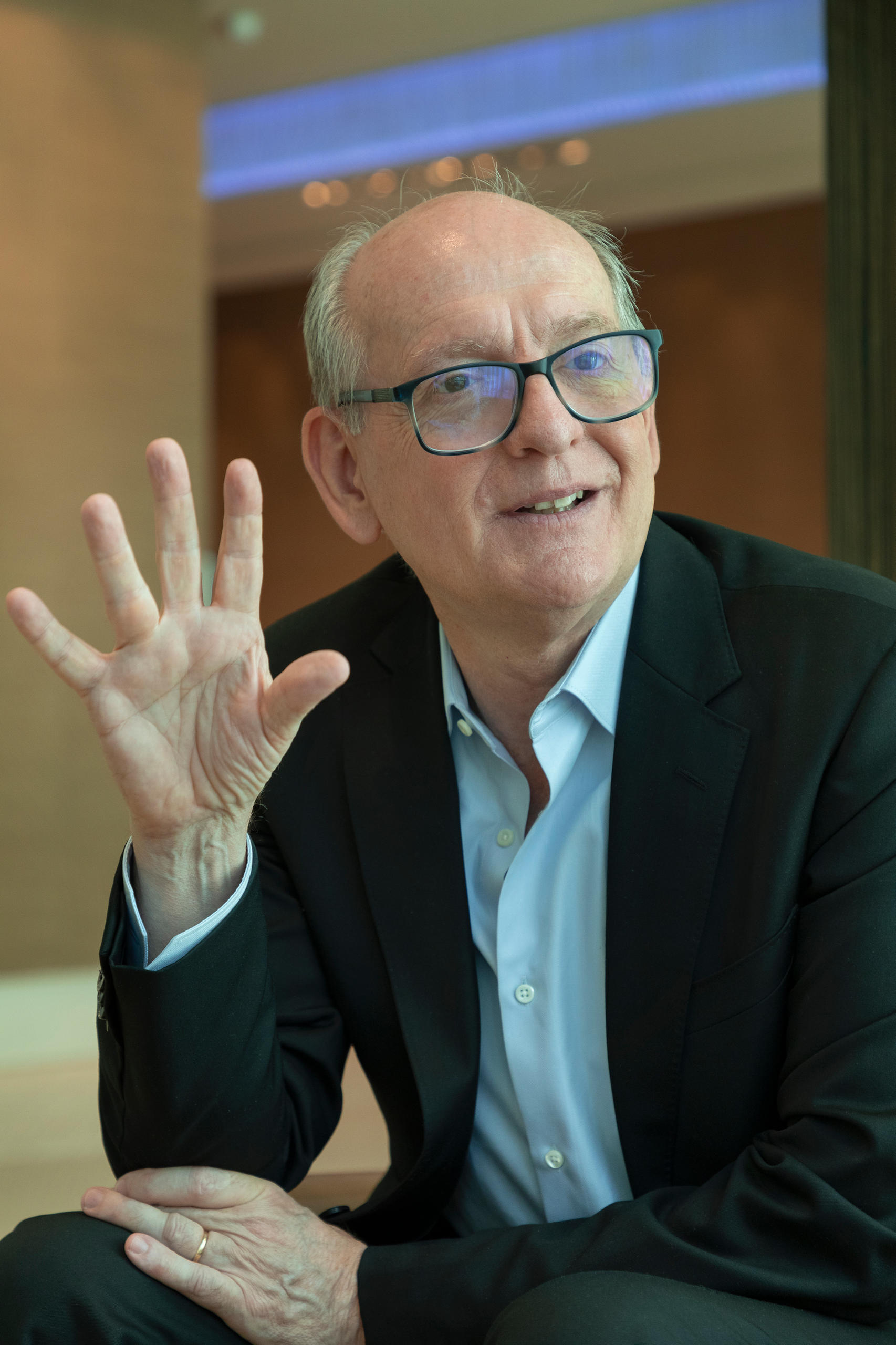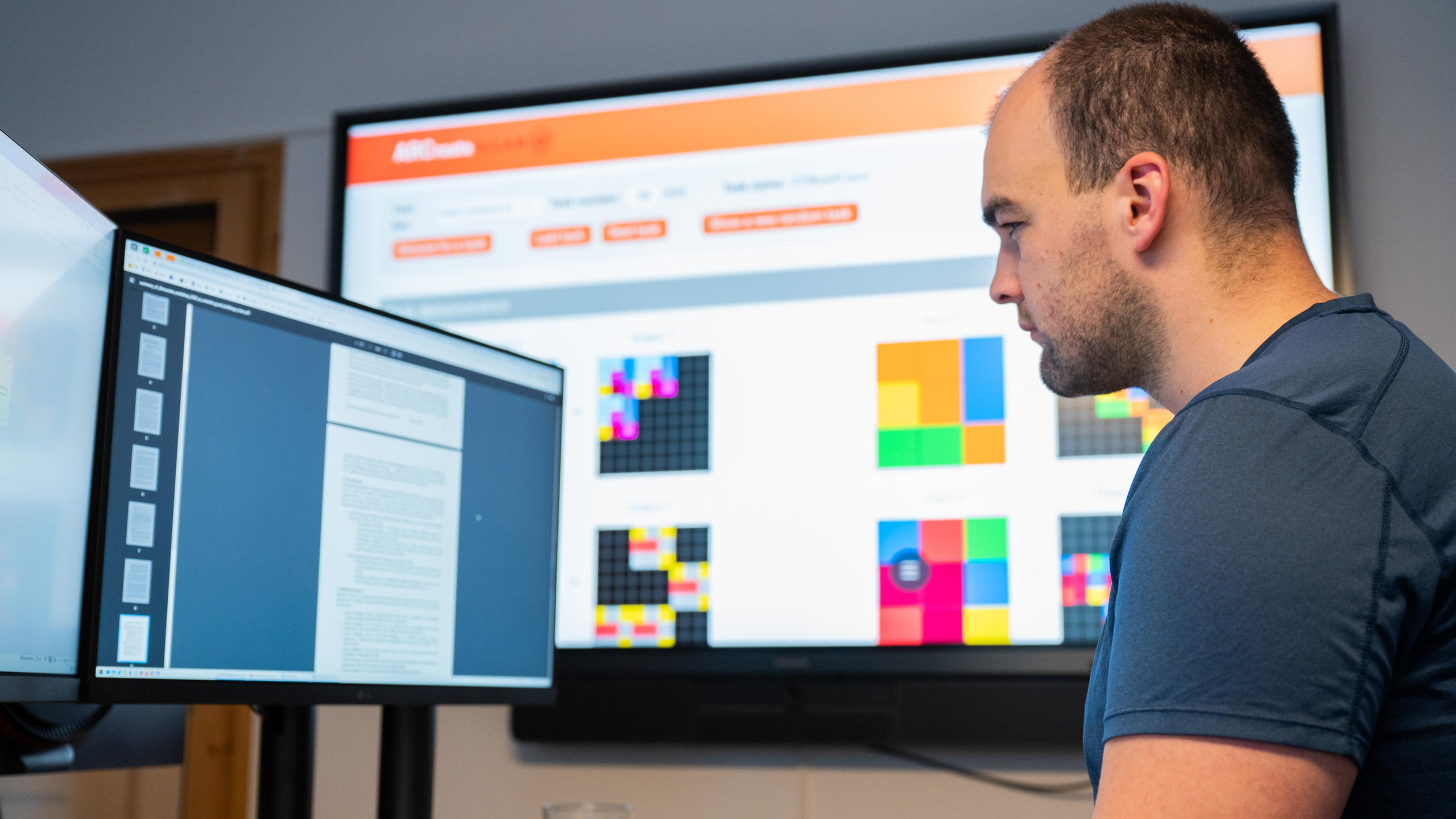
‘Switzerland could do much more’ on AI global governance

World and business leaders will gather at the World Economic Forum (WEF) in Davos from January 15. High on the agenda will be discussions on how to manage artificial intelligence. Switzerland could act as a mediator to push for more inclusive regulations, argue two digital experts.
The WEF’s annual meeting, which will take place in Davos from January 15-19, will be an important platform for both large technology companies and the private sector to push their agenda on the global governance of artificial intelligence (AI).
But to really shake things up, civil society and the countries of the global south should also be seated at the discussion table. These interest groups are not sufficiently represented at the WEF, which remains an insufficiently inclusive event, according to ethics and digital economy experts Niniane Paeffgen and Salomé Eggler.
Paeffgen and Eggler believe that Switzerland can play a central active role in shaping the debate on global AI management and make it more inclusive. As a direct democracy and a country well known as a diplomatic and neutral mediator, Switzerland can give a voice to citizens worldwide. But AI governance is not yet high enough on its agenda.
Niniane Paeffgen is board member at the thinktank Foraus and co-founder of Office for Audacity, a philanthropy consultancy that supports innovative projects. Previously she was managing director of the Swiss Digital Initiative in Geneva.
Salomé Eggler is head of the Digital Transformation Centre Kenya, an initiative funded by the EU and Germany. She is also author at Foraus. Previously she advised the German government as a digital expert and also worked for the UN in New York and Geneva.
SWI swissinfo.ch: The global governance of artificial intelligence is one of the central themes at this year’s WEF. Why?

Niniane Paeffgen: The introduction of ChatGPT was a game changer in the global debate. It triggered a new urgency and growing global consensus that more should be done to actively manage the development and use of artificial intelligence. Governments around the world have realised that they need to act to make the use and application of AI safer, more transparent and more ethical. And it became clear that the longer they wait to establish such common binding principles, the more difficult it will be to implement them globally.
Salomé Eggler: The last quarter of 2023 has also brought about a flurry of initiatives regarding the global governance of AI. The focus of the debate has shifted much more towards binding regulation. But the turning point was the issuing of the EExternal linkxecutive External linkOExternal linkrderExternal link on the safe and reliable development and use of AI by the United States. It’s a step I did not expect to see so quickly. In the past, the US has been rather cautious about comprehensive regulation touching its tech giants.
With the global AI regulation race taking up speed, there is ample room at WEF to discuss how the different governance regimes intertwine and could be harmonised towards a global framework.

More
Has Switzerland missed the train on AI regulation?
SWI: Where does Switzerland fit into this global race? In a recent paperExternal link for the foreign policy thinktank Foraus you wrote that Switzerland should do more to promote global AI governance.
N.P.: Yes, that is so. Switzerland is observing and already today contributing to the debate, but it could do much more. From a political point of view the issue should be higher on the agenda and one of the country’s top priorities when it comes to its efforts in the realm of digital.
As a non-member of the European Union, Switzerland was not involved in the definition of the European AI regulation (AI Act). However, Switzerland actively participates in various international forums and governance processes on AI. For instance, it chairs the Council of Europe’s Committee on AI (CAI), which is currently drafting a legally binding global convention on artificial intelligence, human rights, democracy and the rule of law.
Switzerland also co-organises, together with the International Telecommunication Union (ITU) and other UN organisations, the AI for Good Summit, which is held annually in Geneva. At the beginning of November, Communications Minister Albert Rösti attended the first international summit on AI security organised by the UK and discussed the issue with ministers and ministries from various countries.
Switzerland has always spoken out against a binding regulation on AI. But at the end of November the Swiss government announced that it would examine regulatory approaches in line with European legislation and the Council of Europe Convention on AI.
SWI: Could you give us some examples? What unique resources could Switzerland harness to make a decisive contribution to shaping global AI guidelines?

S.E: Switzerland has several aces up its sleeve. Given that AI is a technology like no other, traditional governance approaches fall short in addressing the challenges posed by AI. Innovative thinking is needed. We have to outline a regulatory framework that addresses the concrete risks of AI while being agile enough to be applied to what is an evolving technology with many unknowns. This is not an easy endeavour. But Switzerland is an ecosystem rich in innovation and new ideas and its diplomacy has the means to tread untrodden paths.
For example, building on its well-known image as a direct democracy, Switzerland could make the global governance debate around AI more participatory and give citizens a voice in how, by whom and for what AI systems are used. Because even though citizens – as the end-users – are the most affected by the technology, they have thus far remained to a large extent unheard.
N.P: The country could also provide a neutral platform for the global debate on AI governance, especially when it comes to contested topics, where geopolitical motives around AI supremacy play a role, e.g. between the US and China. As a neutral country, Switzerland is already well-known worldwide as a mediator between different parties and interests. It could also take on this role in the context of AI, mediating between interest groups, but also between countries with different views on how the technology should be governed.
By virtue of its history and the fact that it hosts a wide spectrum of international organisations such as the United Nations but also many NGOs in Geneva, Switzerland could also work towards positioning International Geneva as pivot point for a multi-stakeholder AI governance at the international level.

More
‘In 2023 governments woke up to the realities of AI’
SWI: Besides Geneva, however, Davos with the WEF is also trying to position itself as a centre of global AI governance. Last year the WEF founded the AI Governance Alliance and organised several events with this objective. Is there a competition between the world of international organisations in Geneva and the world of business meeting in Davos to shape the AI of the future?
N.P: These are two complementary approaches. In Geneva there are international organisations, NGOs and academic actors working on AI governance. And then there is the WEF, also based in Geneva, whose annual meeting takes place in Davos and which brings together mainly private sector and government representatives.
That’s why I think the WEF can play a crucial role in shaping and advancing the global governance of a technology whose development lies in the hands of large tech companies and far away from the reach of central governments. AI companies need to be included in the conversation about the governance of the technology the develop and deploy. They have to play their part in ensuring the responsible and transparent use of AI. The annual meeting in Davos serves to examine very concrete solutions and discuss the role and responsibilities of the private sector.

More
A ‘neutral’ hub for artificial intelligence in the Swiss Alps
SWI: Yet the WEF continues to attract much criticism, mainly due to its being seen as an elitist event for a few business tycoons and wealthy leaders mainly from developed countries. So can we expect real progress on global AI governance at the WEF?
S.E: It’s true, the WEF has not been inclusive enough in the past. If we want to talk about accountability and responsibility, we have to do it towards all the citizens of the world and not just a few.
With regards to what progress to expect from the WEF this year, we will not solve the problem of global AI governance in Davos, that’s for sure. The WEF is just a small piece of the puzzle; it is highly unlikely that a single solution or instrument to govern this technology at a global scale will emerge anytime soon.
N.P: The criticism is justified. In a fractured world with multiple global crises, from climate change, conflicts and polarisation to the deadlock of our multilateral system, issues are not being addressed as quickly as they should. The fact that different key players come together at the WEF is powerful, but real change requires the inclusion of all perspectives and the political will to act. Otherwise it is just nice talk without any consequences.
Edited by Virginie Mangin

In compliance with the JTI standards
More: SWI swissinfo.ch certified by the Journalism Trust Initiative






























You can find an overview of ongoing debates with our journalists here . Please join us!
If you want to start a conversation about a topic raised in this article or want to report factual errors, email us at english@swissinfo.ch.